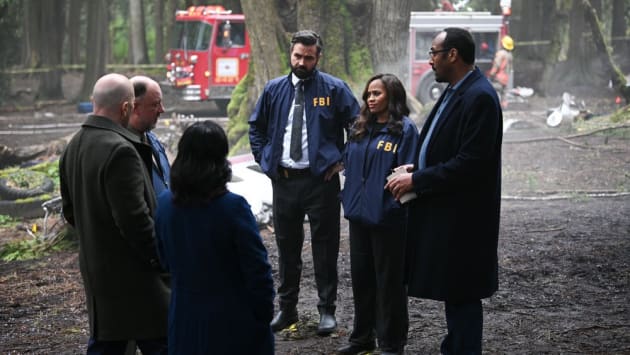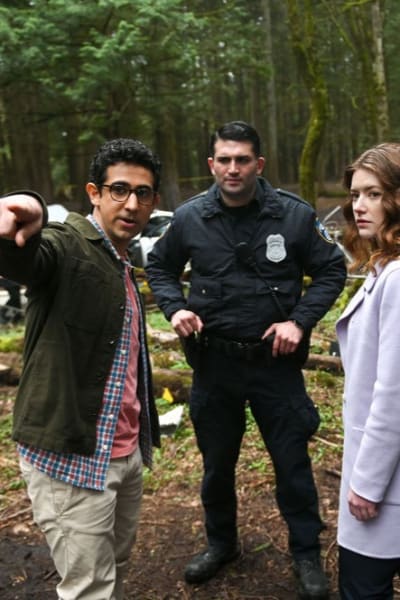The Irrational has found a formula and decided to stick to it.
And while I initially critiqued that formula, it has taken three episodes to get used to it and find its beauty.
Even if more could be done where the show’s characters are concerned, having the cases dominate the episode is more interesting than writing cliché backstories to the characters.
It is also better than giving characters storylines that don’t make sense or add anything to the story.
After watching The Irrational Season 1 Episode 3, it became clear that the show was looking to develop its main characters slowly while exploring other aspects of human existence that the five or so characters can never encapsulate.
The hour saw Mercer and his team dig deep into the final moments of an aviator to determine why they crashed a plane as they were accused of.
Six million car accidents per year. The chances of dying while going to see a plane crash are 1000% greater than dying in one.
Mercer
The show has been serially exploring scientific ideas that very much affect how we respond to certain situations, even though we might not know why.
Our eyes and ears take in electrical signals, which our brains interpret based on our expectations. We don’t see reality; we see our reality.
Mercer
And to do that, it introduces the quack ideas of the world as people try to rationalize their existence. One can go on endlessly about a million and one “alternative thinking” methods that different people have developed to make a buck off other people’s fear of the unknown.
As you move around the different geographical locations of the world, you encounter various bizarre practices.
Even throughout time, there have been several of those. Witchcraft owned the stage for a while before everyone saw its ridiculousness, but even after it lost its grip, some other things rose to occupy its place.
And then cue in tarot readings, palm readings, horoscopes, foretelling the future, etc.
I knew how these things operate, but not the proper word for them. They give predictions that almost everyone will encounter in the near future, and that’s a hundred bucks, please.
For example, Kylie predicted disaster for Mercer, but who can claim their life is disaster-free? Sooner or later, you are bound to run into misfortune. However big or small, you might attribute that to the reading because that’s what you want to see.
It is wise to accept your misfortunes because everyone goes through some and then find a way to cushion yourself from the effects.
The victim of the hour was a pilot accused of crashing a plane.
Dead men can tell no tales, but sometimes I wish there was a way for them to defend themselves. Seeing Lucas’ private life be exposed and weaponized against him was heartbreaking.
Mercer: The truth is, everyone has an incentive to blame the pilot. That’s because he’s dead, and he can’t defend himself.
Marisa: We’ve got some new evidence.
Jace: Hey, Alec. We’ve been going through the pilots, credit card, and bank statements. Are you familiar with the Mastery?
Mercer: They teach classes on how to be attractive to women. I’ve seen better advice on bathroom stalls.
Sure, the manosphere stuff was not great, but weaponizing his mental health against him was very low.
Phoebe: The airline discovered the pilot had been in treatment for depression.
Mercer: Not depression. A depressive episode. There’s a difference.
It is no wonder why many people hide their mental health struggles because they know how they will be perceived.
Thankfully, there was some awareness in the writing about how the show might perpetuate negative stereotypes about mental health, and they corrected that at every turn.
Rizwan was one of the first people to witness the crash. He didn’t think it affected him much because he only saw the smoke and the aftermath.
Honestly, I felt he was justified in believing that he was okay because there have been worse accidents, and that one didn’t seem that grisly.
It might sound insensitive, but that wasn’t a particularly shocking accident.
It took a little thinking for me to remember that people are different and are affected by occurrences.
I’ve seen car accidents, however minor, that haunt me to this day.
Another concept the show explored was Retrospective Framing. The explanation made it clear, so if you read The Irrational Season 1 Episode 3 spoilers and weren’t sure, like me, we have our answers.
This retrospective framing. Let’s say you go out to dinner, and it’s amazing, the best meal of your life. Then someone tells you they served cat food. Now, your experience is ruined even though you thought it was fantastic at the time.
Mercer
It is just a fancy way of saying someone hears what they want to hear or sees what they want to see. We’ve all done that.
There was a nod into the season-long conflict as Marisa revealed that the FBI had leads on the church bombing. It was a small scene with great significance.
There was something noticeable about Phoebe.
Most characters on the show have their “thing.” It was not noticeable in the past episodes, but Phoebe has a way of connecting with people emotionally to help them overcome their fears or concerns.
She did that to CJ’s daughter on The Irrational Season 1 Episode 2 and Lucas’ brother in this episode.
When used correctly (as she does), it is a great skill that can help many people.
Intrusive Thoughts
- The show needs a bigger budget because that plane crash left a lot to be desired.
- Does the FBI pay Mercer for his work? He helps them a lot; there must be some compensation. If they don’t, is that why he doesn’t have his own place?
- Kylie and Mercer had a more natural conversation this time around. Maybe the third time’s really the charm.
- The red pill community has gone mainstream now. That’s concerning.
- Am I the only one seeing Phoebe’s gift, or is that my retrospective framing at work?
“The Barnum Effect” was a great addition to the show’s enjoyable cases and concepts repertoire.
Now would be the time to share your thoughts about it.
Hit the big blue Show Comments button below and start (or join) the conversation.
Catch all-new episodes of The Irrational on Mondays at 10 p.m. on NBC.
Denis Kimathi is a staff writer for TV Fanatic. He has watched more dramas and comedies than he cares to remember. Catch him on social media obsessing over [excellent] past, current, and upcoming shows or going off about the politics of representation on TV. Follow him on X.









